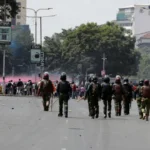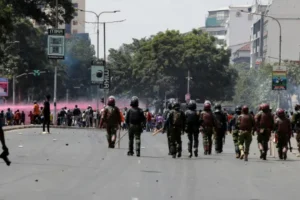In big cities in the Balkans, housing supply outstrips demand, yet prices have skyrocketed. Experts smell a rat.
In 2010, an offshore company called Mellimate made a foray into the Skopje real estate market, snapping up a number of properties within a building in the very centre of the North Macedonia capital.
At the time, urban planning in the capital’s downtown district, Skopje Centre, was largely in the hands of a man called Vladimir Zdravev, then the chair of the municipal council and a key figure in adjusting the district’s urban plan to make way for a controversial government development project under the name ‘Skopje 2014’.
A gaudy, neo-classical makeover of the city, Skopje 2014 was the pet project of Nikola Gruevski, then the prime minister and since 2018 a fugitive in Hungary but which also served to line the pockets of a host of officials in Gruevski’s administration.
A decade after Mellimate’s purchase, the properties in question were sold to a company controlled by the Zdravev family, which by this point had built up a significant real estate portfolio.
In July this year, Zdravev was placed under investigation on suspicion of syphoning money from public coffers by inflating prices for the casting of statues in Italy for Skopje 2014 in the late 2000s and early 2010s, around the time Mellimate entered the Skopje property market.
Prosecutors have not detailed the assets they have frozen, but they have accused Zdravev of “making transactions of illicit funds through offshore companies”.
Even a cursory look at the real estate market in Skopje suggests he’s not the only one.
According to figures from the country’s last population census in 2021, 70,000 housing units in the capital sit empty. The number of apartments in the city rose by 30 per cent between 2002 and 2021, yet over the same period the population grew by just three per cent.

The number of apartments in the city rose by 30 per cent between 2002 and 2021. Photo by BIRN/Goce Trpkovski
Yet while there is a glut of new homes in Skopje, Belgrade, Novi Sad, Pristina, Tirana and other big cities in the Balkans, it remains a seller’s market, with prices skyrocketing. And when it comes to purchases, cash is king.
It’s a state of affairs that has alarm bells ringing among money laundering watchdogs.
“Construction continues out of proportion and beyond realistic plans, but not without economic effect,” said Sladjana Taseva, head of the North Macedonia chapter of Transparency International and former president of the country’s Anti-corruption Commission. “There is an inflow of money and it is being spent.”
Market logic upended
Big cities up and down the Balkans have experienced construction booms over the past five or six years, despite only modest population increases.
In the Kosovo capital Pristina, the latest available data on empty apartments is from the census of 2011, when 15,000 uninhabited housing units were registered. The construction boom was just getting underway, and since then 575 building permits have been issued for multi-residential buildings with a total development space of nearly six million square meters. The next census is scheduled for the autumn.

Housing supply outstrips demand, yet prices have skyrocketed. Photo by BIRN/Goce Trpkovski
Accurate data is hard to come by in many places, but a comparison of household and apartment numbers in Serbia, for example, shows there are roughly 1.1 million more apartments than households. Serbia has a population of 6.8 million people.
Despite such rates of construction, housing prices are still rising.
Last year, the most expensive apartments in the Serbian capital, Belgrade, were on the market for 10,400 euros per square metre, and 3,500 euros in Novi Sad. That compares with 3,200 euros in Belgrade and 1,400 in Novi Sad in 2016.
In that six-year period, almost 37,000 new apartments were built in Belgrade and 18,500 in Novi Sad, yet Serbia’s population shrunk by just over half a million between 2011 and 2021.
Real estate is generally considered a good place to invest money, but in countries where scrutiny is weak and corruption rife, the market is a favourite for individuals who wish to launder the proceeds of crime.
“Investment in construction and real estate has a long history of absorbing of illegal monies in the Western Balkans, given that the sector is both meaningful in economic share and poorly regulated,” wrote the Global Initiative against Transnational Organised Crime, GI-TOC, in its 2020 report on illegal financial flows in the Balkans.
Buying apartments while under construction has particularly advantages when it comes to money laundering: often, the origin of the money does not have to be disclosed, while buyers can pay in multiple installments, in cash, and so stay below the threshold that requires payments to go through the banking system.
The return is also often better when buying a property before it is finished.

Paying higher-than-market prices to subcontractors also allows irregular money to enter the financial system. Photo by BIRN/Goce Trpkovski
Paying higher-than-market prices to subcontractors also allows irregular money to enter the financial system. Then there are those who make direct loans to finance real estate projects, cutting out the banks.
“Firstly, new construction almost universally requires clients to pre-pay for the floorplan, which is sold before construction begins. The industry remains largely cash-based, and real estate agents interviewed for the purpose of this report said that sales made entirely in cash are not uncommon. In cases where sales are underwritten by financing agreements, these rarely come from banks or other financial institutions but are instead private loans from other commercial enterprises,” said the GI-TOC report.
“Real estate transactions which are cash-based can avoid the scrutiny of the formal financial system as the provenance of the funds cannot be known.”
According to GI-TOC, one indicator of such dubious dealings is the large rise in average prices per residential square metre between 2017 and 2020 – by roughly 500 euros in Albania, 400 in Kosovo, 300 in North Macedonia, and 700 in Serbia.
Yet investigations into the phenomenon are scarce.

In North Macedonia, the Financial Intelligence Office, UFR, ranked the construction sector first in terms of the risk of money laundering. Photo by BIRN/Goce Trpkovski
‘Money comes first’
In 2021, the special prosecutor’s office in the Albanian capital, Tirana, opened a probe in collaboration with Italian authorities based on wiretapped conversations that suggested the Calabria-based ‘Ndrangheta organised crime group was seeking to bribe officials in Albania for construction permits.
The investigation was launched after the conversations were published by Albanian ‘Ora’ television channel.
Albania’s Special Prosecution for Organised Crime and Corruption did not respond to questions concerning the progress of the investigation.
In Serbia, according to data from the country’s Anti-Money Laundering Agency, in 2020, 86 per cent of transactions in the real estate were made in cash – a major red flag.
Between 2018 and 2020, the Agency reported, investigations were launched into 66 individuals, 48 of whom were charged. Eleven of those charged were convicted of money laundering via real estate.
In North Macedonia, the Financial Intelligence Office, UFR, ranked the construction sector first in terms of the risk of money laundering in an assessment published in 2020.
Some 6,500 companies operate in the sector, raking in 1.5 billion euros annually, and though most transactions are carried out through banks, still many are in cash, particularly when individuals instead of legal entities are involved.
“The practice of individuals acting as both investors in construction and as sellers of newly-built real estate is accompanied with the use of large sums of cash both for the construction of buildings and for the sales,” the UFR wrote in the assessment of the period 2016-18.

The importance of the construction sector for local economies and for the income of municipal budgets discourages institutions from investigating more seriously. Photo by BIRN/Goce Trpkovski
In that period, the UFR opened 16 money laundering cases involving companies mainly dealing in construction. BIRN was unable to ascertain the outcome of these cases.
Data from the Basic Court in Pristina, Kosovo, shows that there have been 32 cases of money laundering. The court, however, was unable to provide specific data on whether any of those cases concerned the construction sector. The Special Prosecution did not respond to requests for information.
In North Macedonia, Nuri Bajrami, a member of the Anti-Corruption Commission, criticised the state’s approach to the National Anti-Corruption Strategy, in its drafting and implementation.
The relevant institutions delegated lower-level officials, he said, and were “weak in creating policies and even weaker in implementation”.
“And when the government changes, everything stops,” Bajrami told BIRN.
Taseva, of Transparency International, said the importance of the construction sector for local economies and for the income of municipal budgets discourages institutions from more seriously investigating the source of the money involved.
“The state takes greater care of those who want to build,” she said, “because money comes first”.
This story was produced with support from the Global Programme ‘Combating Illicit Financial Flows’ implemented by the GIZ and financially supported by the German Federal Ministry of Economic Cooperation and Development and the Norwegian Ministry of Foreign Affairs.
Its contents are the sole responsibility of BIRN and do not necessarily reflect the views of the GIZ, the German Federal Ministry of Economic Cooperation and Development or the Norwegian Ministry of Foreign Affairs.
NOTE: This article was amended on September 29, 2023, to clarify that the quotes attributed to Kristina Amerhauser, a co-author of the Global Initiative against Transnational Organised Crime, GI-TOC, 2020 report on illegal financial flows in the Balkans are in fact taken from the report itself, as well as to clarify the exact content of the quotes.
Source: balkaninsight











